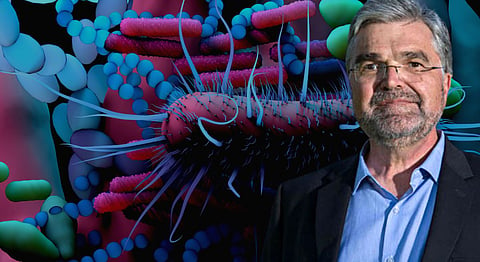The hidden conversation in our bodies – expert Dr Emeran Mayer on the brain gut microbiome system
Western medicine has largely failed to appreciate the complexity of how the brain, gut, and more recently, the gut microbiota—the microorganisms that live inside our digestive tract—communicate with one another. Though many people have had "gut feelings" or "gut instincts", the scientific basis of these terms and how they form part of the hidden conversation in our bodies falls far outside the perimeters of our understanding. Medical research, however, is increasingly uncovering stunning new information about the extraordinary brain gut connection. To explore the brain gut microbiome system and its implications on human health and disease, BizNews spoke to Dr Emeran Mayer, a world renowned gastroenterologist and neuroscientist and a pioneer of medical research into brain gut interactions. The degree to which the microbiome is insinuated into virtually every aspect of our health, and the opportunities this presents in terms of disease management, is astounding. – Nadya Swart
Please see the timestamped topics below
00:23: Professional positions held and background
03:20: Scientific basis of the terms "gut instinct" and "gut feeling"
11:36: How early life adversity predicts brain-gut alterations associated with increased stress and mood
16:39: Defining the human microbiome
20:21: IBS and the gut microbiome
26:01: Key findings of Dr Mayer's book The Mind-Gut Connection
29:42: Research into the link between cancer and a loss of microbiome nutrients
32:57: Vital ways to combat what we do know about the connection between (for example) colorectal cancer and the gut microbiome
35:47: C-section vs natural birth – how this impacts the transition of a healthy microbiome from the mother to the infant
39:13: How the health of the soil and plant microbiome is linked to gut and brain health
Excerpt from the interview with Dr Emeran Mayer
Dr Emeran Mayer on the evolution of the brain gut microbiome system
The brain and the gut is really one system. We know this from evolution. They evolved from one single origin, which was the gut-based brain, and then later our big brain developed. It's one system. It's not that there are two independent components of our body, of our physiology. People often think about artificial intelligence and what this could do. Like the brain in a jar probably wouldn't work because you take away half of that system. You're not taking away the gut or the heart. You're taking away half of an essential part of that system. Then coming to the gut-based decisions, it gets harder.
So every time we go through emotional moments from the time we're born and are crying as a baby and [experience] negative emotions because we are hungry and then get satiated after being nursed, these emotions and their corresponding gut feelings get encoded somewhere in our nervous system. So, we have these millions, possibly billions of minute recordings or emotional clips, video clips in our nervous system: a huge database.
And one thing that I proposed in my book is what you do when you make a gut-based decision: you access these memory banks like a search engine, which can, within milliseconds, come up with the right answer. If you type in something in your Google search, you don't have to type in the whole word. The system knows this after the first few letters.
And so, this would be the equivalent of making these gut-based decisions instantaneously without having to go through plus and minus considerations, which is a very slow process because that goes through your prefrontal cortex. It's linear. It almost operates like an old fashioned computer that we're no longer using, whereas the gut-based decisions are really something that is similar to these search engines and supercomputers that we use in our technical world.
On diet and microbial communication
Diet is a major factor in medical science and in disease, because the microbes are the interface between the diet that comes in from the outside and what goes towards our body, as the microbes translate information that's contained in the diet and other things like chemicals or medication we take. It translates this into the language of the immune system and then from there throughout the body. So clearly, this re-emphasis or current emphasis on healthy nutrition and the bad influences of the standard American diet have most of their momentum from the microbiome research and will continue to do so.
So, if we accept the fact, – [on] which there's many epidemiological studies and cross-sectional studies on hundreds of thousands of patients – that a healthy diet is associated with better health, including brain health, and an unhealthy diet like the standard American diet is associated with negative health outcomes, then the microbes play a central role in this. Within that field, the inflammation or the interaction with the immune system seems to be one of the key mechanisms.
The microbes do two things. One, they are the major factor that activates the immune system, but they also produce a lot of molecules and signalling molecules that are not inflammation-related, but interact with inflammation somewhere on a particular organ, like the heart or the brain or the liver. The combination of inflammation with these signalling molecules in the microbes is really what makes them so powerful in terms of influencing our health and our disease.
Read Also:

